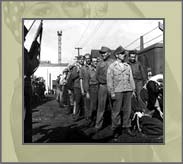|
War
Comes Home

German prisoners of war were brought to the United and kept in camps
across the country. These Germans were captured in 1943 and sent
to a prison camp in Virginia. Photo Credit: Corbis Images. |
My mom did not
work for the defense industry, but her life touched the war in a
different way. My mom was a chief clerk on a pier in Staten Island.
She had to take care of all the paperwork for all the goods coming
into the country and sending those goods to different destinations
in the U.S.
On that pier
was a fumigation
plant that before the war had been used to keep foreign cotton from
infecting American cotton crops with foreign parasites.
During the war,
that fumigation plant was the first stop for German prisoners of
war. The prisoners would be brought over from Europe and deloused
in the fumigation plant. Afterwards, they were put on trains and
transported to prison camps in places like Oklahoma or Virginia.
The German prisoners sometimes left things in the fumigation plant, and I think they traded objects for cigarettes from the guards. The guards
sometimes gave my mom these objects. These were things like knives
with swastikas on them. My mom would bring them home, but my grandmother
would not let them in the house, so we gave them away.
My heritage
is German; our family came to the United States in the 1850s. Though
I never felt any anti-German feelings against me, I had a cousin
whose grandfather used to be very pro-German. He would talk about
how great Hitler was in the beginning of the war, and he got into
a lot of trouble with his neighbors. He had to change his tune,
and soon he realized that Hitler was not great after all.
Think About
It
Why did Americans bring German prisoners of war over to the U.S.?

|

